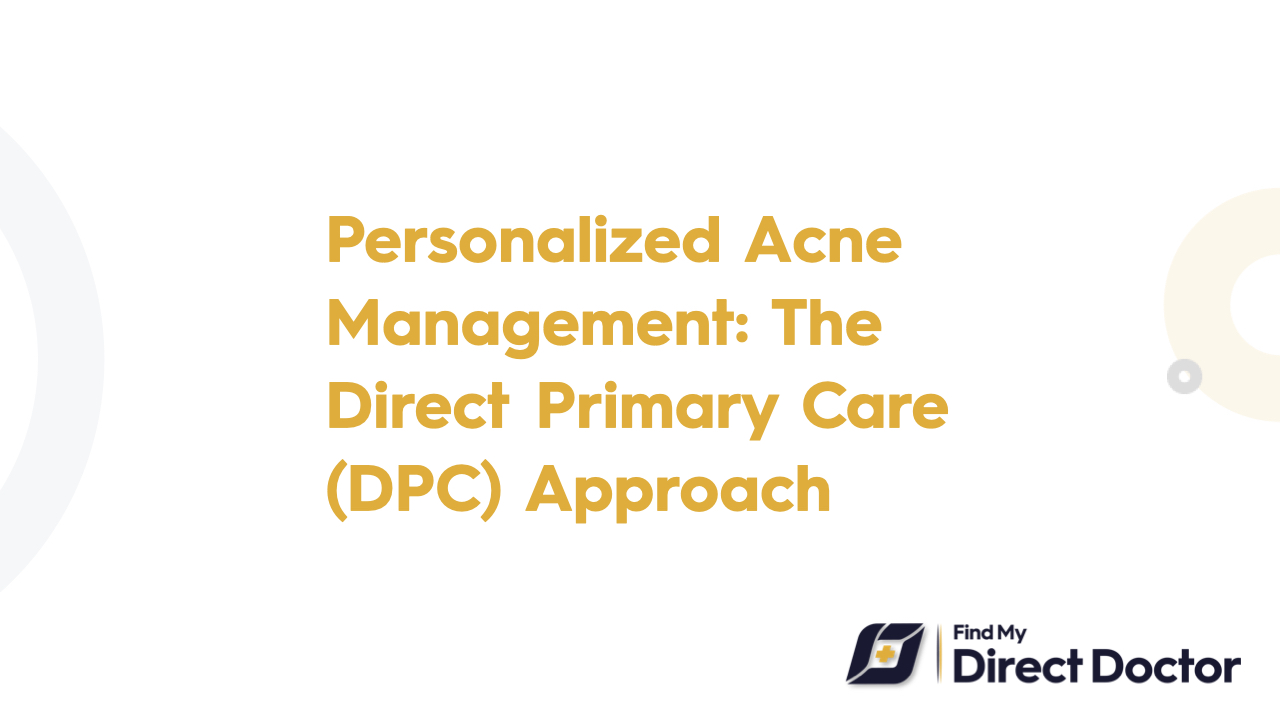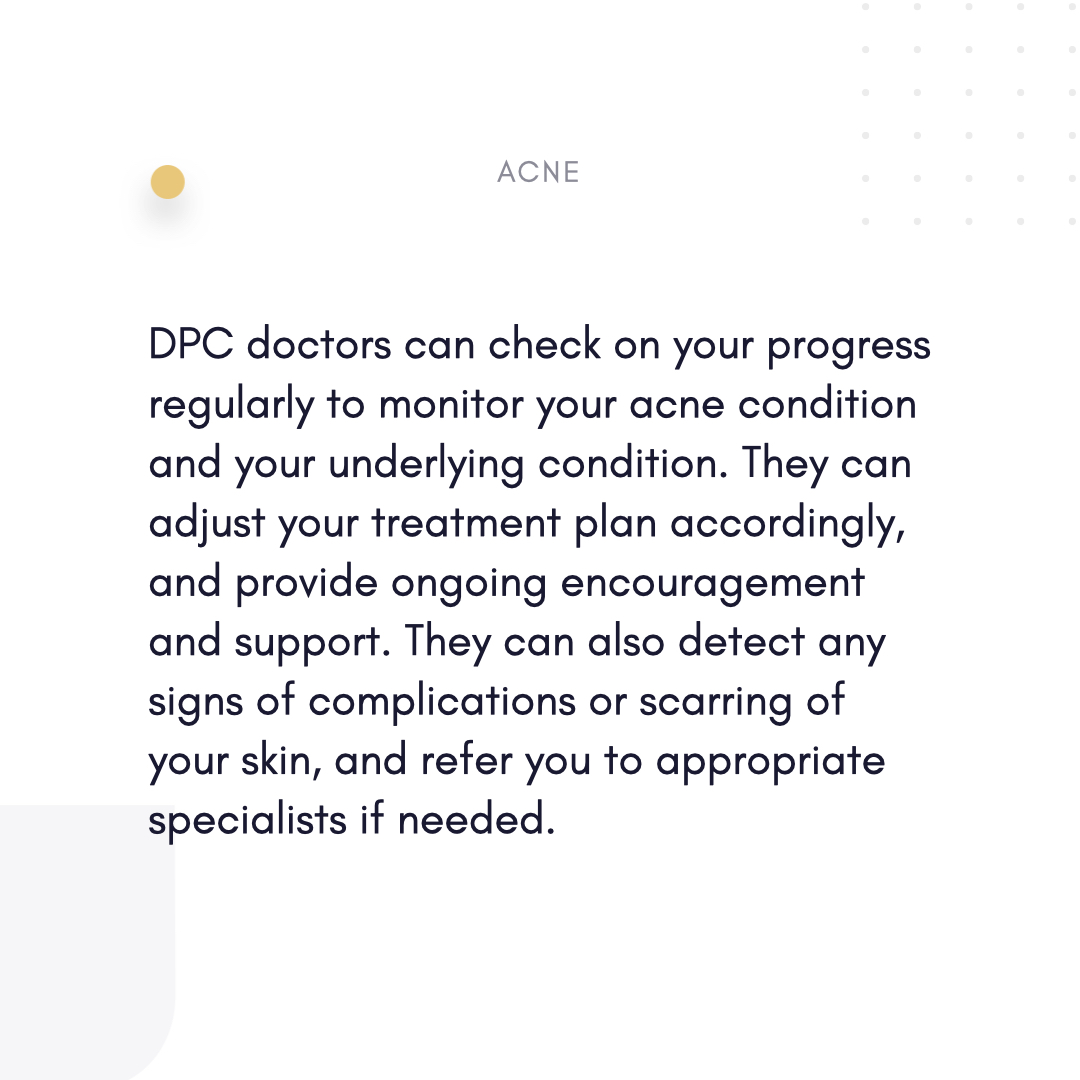Acne and Direct Primary Care (DPC): Clear Skin Through Personalized, Affordable Care
From agonizing cystic acne that lowers self-esteem to relentless hormonal breakouts in adults, acne affects over 50 million Americans yearly. Although over-the-counter products and sporadic dermatology visits usually fall short, Direct Primary Care (DPC) provides a transforming solution: continuous, compassionate treatment addressing acne at its roots—without insurance hassles or surprise bills. DPC helps patients to get long-lasting results in the following way.

Knowing Acne: More Than Just Skin Deep
Acne results from oil, dead skin cells, and bacterial clogging of hair follicles. Contributing causes include:
-
Hormonal changes: Puberty, menstrual cycles, PCOS.
-
Excess sebum production: Often genetic.
-
Bacterial overgrowth: Cutibacterium acnes.
-
Lifestyle triggers: Stress, diet, or pore-clogging skincare.
-
Varieties of acne:
- Mild: Whiteheads, blackheads.
- Moderate: Papules, pustules.
- Severe: Cysts (scarring risk), nodules.
How DPC Offers Expert Acne Treatment
Under the membership model known as Direct Primary Care (DPC), patients pay a monthly fee—usually USD 50–150—for unlimited access to their main care physician. This translates for those with acne as:
- No hurried 10-minute visits; time to investigate root causes like hormones, diet, or stress.
- No hidden fees; transparent pricing for labs, drugs, and specialist referrals.
- Same-day consultations via call, text, or photo reviews for flare-ups.
-
Root-Cause Investigation:
- Hormonal testing: Check testosterone, cortisol, or estrogen imbalances.
- Lifestyle reviews: Skincare routines, diet diaries, stress triggers.
- Medication history: Identify acne-aggravating drugs (e.g., steroids, lithium).
-
Individualized Treatment Plans:
Following American Academy of Dermatology (AAD) guidelines:
- Topical treatments: Retinoids (tretinoin), benzoyl peroxide, azelaic acid.
- Systemic treatments: Oral antibiotics (doxycycline), hormonal meds (spironolactone), isotretinoin.
- Lifestyle integration: Low-glycemic diets, non-comedogenic cosmetics, stress management.
-
Constant Support and Adaptations:
- Regular check-ins to refine treatments based on progress.
- Affordable prescriptions (e.g., tretinoin at USD 20/month vs. USD 75+ retail).
- Mental health support for anxiety/depression linked to acne.
DPC Benefits for Acne Patients
-
Accessibility:
- Same-day visits to prevent scarring from delayed treatment.
- Direct communication via text/email with your doctor.
-
Individualization:
- Plans tailored to hormonal, bacterial, or stress-related acne.
- Holistic focus on gut-skin health, sleep, and diet.
-
Cost Transparency:
- No co-pays/surprise bills; upfront pricing for labs, meds, or specialist referrals.
- Save 40–60% on medications like spironolactone (USD 10/month) or isotretinoin.
DPC's Customized Acne Management
The AAD stresses treatment based on acne severity, patient preferences, and risks. DPC delivers:
Personal Success Stories from Real Life
- Case 1: Lena, 24, struggled with hormonal acne. Her DPC doctor prescribed spironolactone and paired her with a dietician to cut dairy. Her skin cleared in 3 months.
- Case 2: Ethan, 19, avoided a 6-month dermatology waitlist. His DPC doctor secured 30% lab discounts and started isotretinoin to prevent scarring.
FAQs: DPC and Acne
- Q: Can DPC prescribe isotretinoin (Accutane)?
- A: Yes! DPC doctors handle prescriptions and labs at lower costs.
- Q: Do natural remedies work?
- A: DPC combines evidence-based treatments with options like zinc supplements or green tea extract when appropriate.
- Q: What does treatment cost?
- A: Most save hundreds vs. insurance. Full acne care (visits + meds) averages USD 100/month.
Why DPC Is a Revolution for Acne Treatment
The AAD emphasizes personalized, ongoing care. DPC excels by:
- Prioritizing accessibility: Timely treatment to prevent physical/emotional scarring.
- Enhancing collaboration: Time for shared decision-making.
- Reducing costs: Transparent pricing from tretinoin to specialist referrals.
Start Your Journey to Clear Skin Today
Acne doesn’t have to rule your life—or budget. With DPC, gain a partner committed to your unique skin journey, offering affordable, customized care beyond quick fixes.






